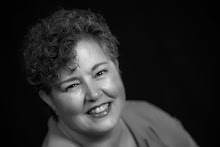Inadequate. Loser. Incompetent. Failure. Pitiful. Jealous.
What am I doing here anyway?
I have just completed the first night of the Pikes Peak Writers Conference in Colorado Springs, CO. It's my third writers' conference but my first PPWC. I am overwhelmed with information and it's only the first night.
I have a hearing problem which makes it especially difficult to hear people in crowds or if there are other distracting noises around me. This problem doesn't help my feelings of insignificance as I listen to my writer friends schmooze the agents and editors gathered around the bar and in the lobby of the Marriott Hotel. I feel stupid and self-conscious because I'm missing half the conversation, and I can't cup my hands to my ears all night long--people will wonder what the heck my problem is. Not to mention I'll look like weird.
My writer friend Deb has been appointed as next year's conference director. I'm so jealous that I can't see straight. Don't get me wrong: I love her dearly and I'm very happy for her, but I wish it was me. Well, no, not really, but boy, would that designation look awesome on my query letters!
Another writer friend Anita won the VIP package door prize at the Write Brain Session on Tuesday and gets to go to the Staff Mixer with Deb. That leaves me and my self-described "overly-talkative malcontent" friend in the lobby by ourselves, eating tasteless potato chips and listening to the next wannabe best seller brag about his high IQ and his fantastic writing skills that somehow get shot down by everyone in his critique groups and all the agents and editors he talks to. In other words, it can't be that fantastic, especially since he's been working on it for three years and still can't get someone to say, "Send it to me."
I was so excited to be able to attend this conference, especially since a very generous friend paid my way. But now I'm feeling so inadequate that I'm bashing myself, my writing skills, my stupid idea for a book, and convincing myself that I'll never get published so I should just give up right now and go home.
I'm angry that I couldn't hear 80% of the conversations that went on at my dinner table where the agent I'm going to pitch to tomorrow is seated.
I'm angry at all those people who can roll off their log line effortlessly, yet I've revised mine thirty-two times and I'm still not happy with it.
I'm angry at the drunk lady sitting beside me at the dinner table. Not because she's so drunk and the smell of her martini breath is making my stomach churn, but because her slurred speech makes it even more difficult for me to understand her over the din of the other dinner guests.
I'm angry at the romance writer next to the bar who is dominating the conversation with the agent I'm pitching to tomorrow, not that I can hear what they're saying in the first place. And not that I'm brave enough to barge in and take over anyway.
I'm angry at the people who brag about "nailing" their R&C, who did "fabulous" reading their manuscript, or are able to say, "She asked me to send her my first three chapters!" after their pitch appointments.
I quietly excuse myself to the restroom. My ears ring as if I've just gotten home after a heavy metal rock concert. Afterwards, I meander through the lobby, trying to find some people who talk loud enough for me to actually hear what they're saying. I desperately want to fit in and laugh at the appropriate times, add a quip or two, and crack everyone up. Instead, I feel like a middle-schooler and sit at a small table, by myself, and read the schedule for tomorrow.
Tears sting my eyes. I wish I wasn't so introverted, so shy that I can't seem to broach the subject of my memoir, even with other writers who are as panic-stricken as I am. None of my friends seem to have this fear--they're rubbing elbows with the best of them.
I know that being a writer is hard work. I know that words have power. I know I have a message to get out . . . a story to tell.
But it also looks like "bleeding from the forehead" (as James N. Frey described in his keynote speech at dinner tonight) is as far as I'm ever going to get.
I wipe my tears, put my conference literature away, and sneak out of the hotel without saying goodbye to anyone, hoping that tomorrow goes better.
The Pruning Principle
2 years ago




